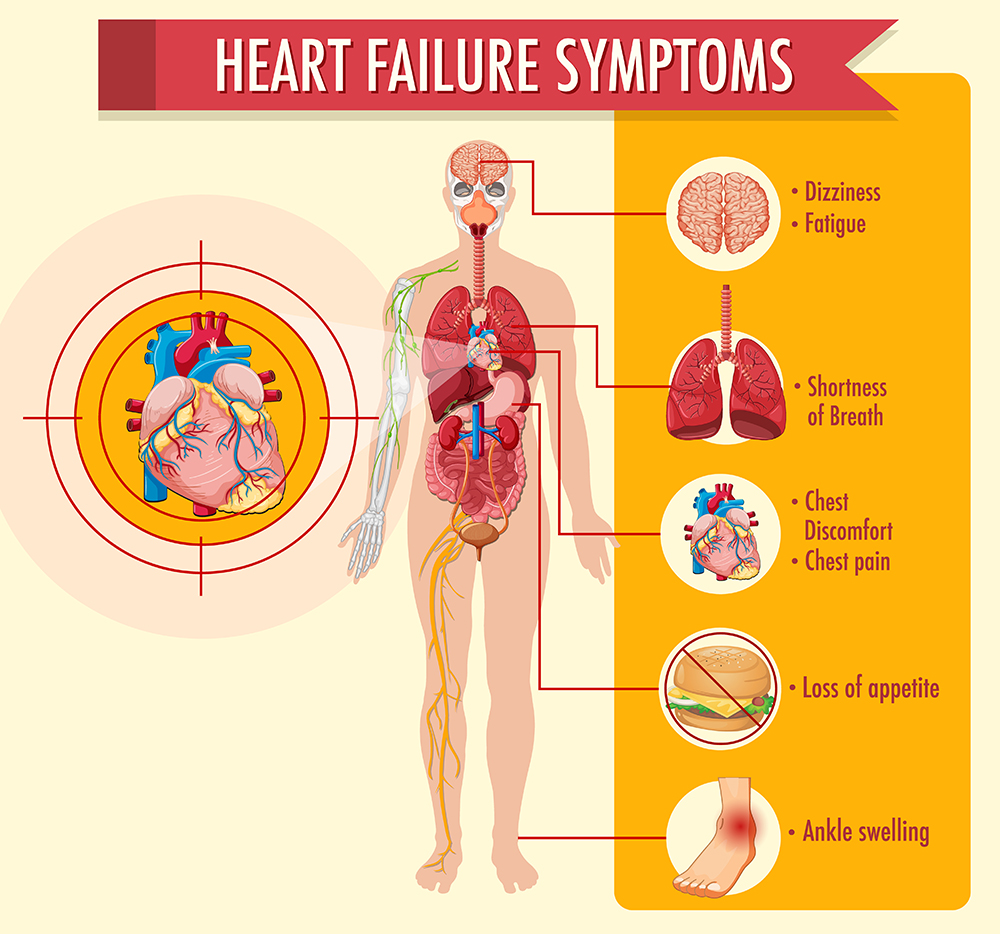Heart failure is an umbrella term for a set of physical symptoms arising due to the gradual deterioration in the heart’s pumping ability. The term “congestive heart failure” was traditionally used because the condition resulted in fluid buildup and congestion in the lungs. However, doctors and medical researchers have found that it causes a wide array of other symptoms. That’s why they now refer to the condition as heart failure. A healthy human heart relaxes and contracts nearly 100,000 times a day and pumps more than 2,000 gallons of blood throughout the body. The cardiovascular system also includes a network of arteries and veins to transport deoxygenated and oxygenated blood to and from the heart. If any part of the system falters, it can disrupt the flow of blood to vital organs. Heart failure is characterized by a progressive decline in the heart’s power to pump blood. When that happens, the heart goes through a series of structural changes (knowns as cardiac remodeling) and beats faster to pump more blood. Also, the blood vessels constrict to stabilize blood pressure and restrict blood supply to non-critical organs like the skin and kidneys. When blood flow to the kidneys reduces, it compels the body to retain more fluid and sodium. All these short-term fixes result in more damage and cause even more stress to the heart muscles. That, in turn, results in further deterioration of the heart’s pumping action. The heart failure symptoms vary depending on whether they’re caused due to a lack of oxygen or an increase in fluid build. Lack of oxygen supply results in the following heart failure symptoms : Excess sodium and fluid buildup in the body causes the following heart failure symptoms: The most common causes of heart failure include: There are various ways to categorize congestive heart failure. Depending on the part of the heart’s pumping that’s affected due to heart failure, it can be of the following types: Also, depending on the side of the heart that’s affected, heart failure can be categorized as left-sided failure and right-sided failure. The treatment approach a doctor will use depends on the type of heart failure a patient has developed. The American College of Cardiology and the American Heart Association has outlined four stages to denote the progression of heart failure. While Stage A is characterized by risk factors like underlying medical conditions, stage B shows structural changes in a patient’s heart. The more advanced stages (C and D) present visible symptoms. Heart failure (also known as congestive heart failure) is a progressive condition caused by the heart’s inability to pump blood adequately. It results in symptoms like shortness of breath, fatigue, weight gain, and brain fog. Dr. C Raghu is an eminent cardiologist with more than two decades of experience. If you or someone you know has developed congestive heart failure symptoms, consult Dr. Raghu to explore your treatment options.
What Happens in Congestive Heart Failure?
Congestive Heart Failure Symptoms: A Closer Look

Causes and Types of Congestive Heart Failure
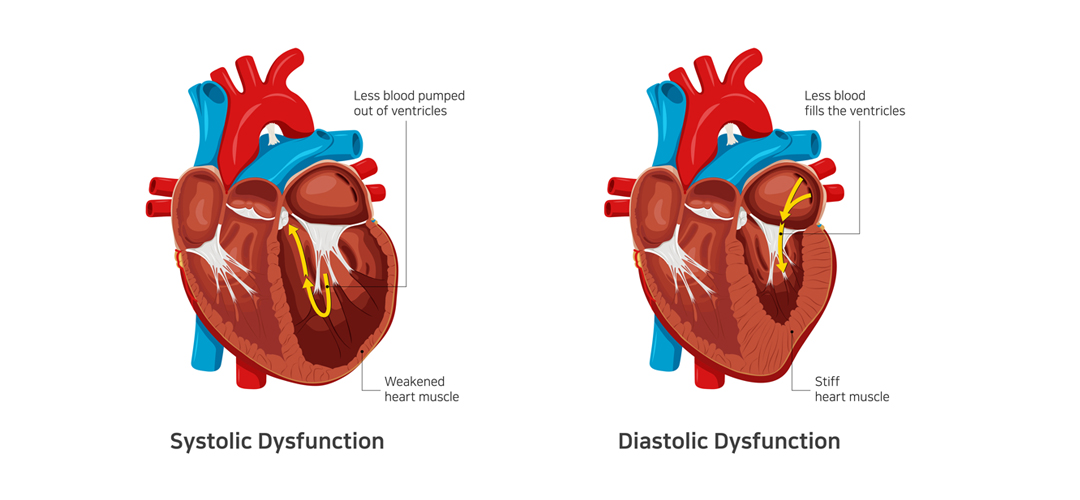
Stages of Heart Failure
In Conclusion
Book Online Consultaion
Understanding Congestive Heart Failure Symptoms Blog
Subscribe the Hearty Life Blogs

DR. RAGHU
Cardiology Coronary, Vascular and
Structural InterventionsConditions & Diseases
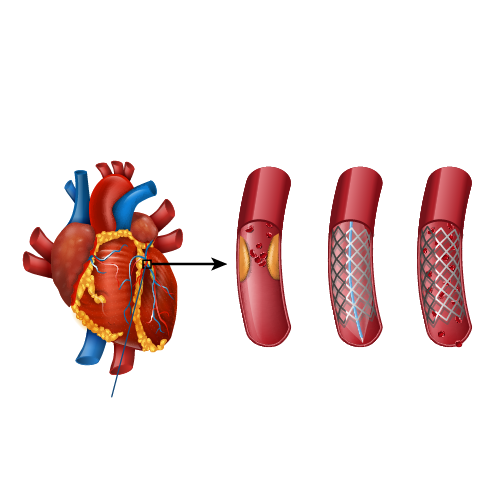
Angioplasty
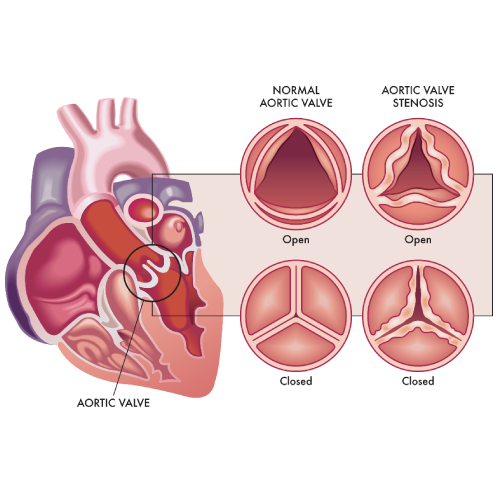
Aortic Stenosis
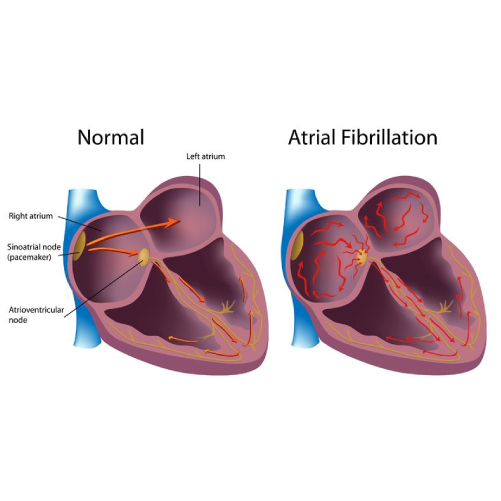
Atrial Fibrillation
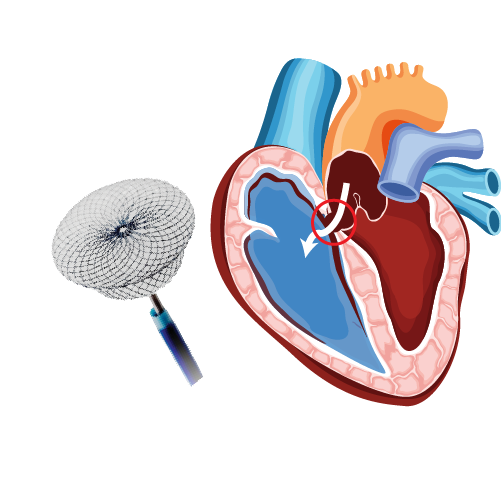
Atrial Septal Defect
congestive heart failure / Dr Raghu
In our previous blogs, we’ve discussed the common symptoms and treatment options for heart failure. However, the plan of treatment depends on the side of the heart that’s affected.
Heart failure is usually of two types – left-sided and right-sided. While left sided heart failure is the result of the weakening of the left ventricle, right sided heart failure is caused due to a weak right ventricle.

In this article, we’ll take a closer look at right sided heart failure to understand its causes and symptoms. Let’s get started.
What Is Right Sided Heart Failure?
Right-sided heart failure is a condition characterized by the weakening of the heart’s right ventricle. That means the right ventricle can’t pump deoxygenated blood into the lungs with maximum efficiency. It results in a buildup of blood in the veins, thus causing swelling in the legs and abdomen.
What Causes Right-Sided Heart Failure?
The most likely cause of right sided heart failure is a weak left ventricle. In other words, left sided heart failure eventually leads to right sided heart failure.
When the left ventricle becomes weak, it can’t pump an adequate amount of oxygen-rich blood into the body. It causes blood to back up into the lungs. That, in turn, means the right ventricle has to work harder to pump oxygen-depleted blood into the lungs. It results in the gradual weakening of the muscles and leads to right sided heart failure. Left sided heart failure is usually caused by coronary artery disease, hypertension, or a previous heart attack.
Additionally, any condition that taxes the right ventricle’s pumping power can lead to right sided heart failure. These include:
- Chronic respiratory disease
- Pulmonary hypertension
- Pulmonary embolism
What Are the Symptoms of Right Sided Heart Failure?
One of the most common right sided heart failure symptoms is swelling in the legs and abdomen due to fluid buildup. Accumulation of fluid in the abdomen can also cause nausea, bloating, and loss of appetite.
Other symptoms of right sided heart failure include:
- Shortness of breath
- Chest pain
- Heart palpitations
How Is Right Sided Heart Failure Diagnosed?
Firstly, a cardiologist will ask you about your symptoms and medical history. Also, they’ll perform a physical examination to check your blood pressure and heart rate. They might even use a stethoscope to identify abnormal heart sounds.
They can also recommend routine blood tests, such as complete blood count, lipid panel, and electrolyte tests. Additionally, they can order a brain natriuretic peptide test.
Besides blood tests, doctors also order the following lab tests to diagnose right sided heart failure:
- Chest X-ray
- Electrocardiogram
- Echocardiogram
- Exercise testing
- Coronary angiography
Right Sided Heart Failure vs. Congestive Heart Failure
Congestive heart failure is an outdated term that was used to refer to fluid buildup in the lungs due to a weak left ventricle. However, a more inclusive term – heart failure – is used now. Right sided heart failure is a specific type of heart failure caused by a weak right ventricle.
Final Thoughts
The most common right sided heart failure symptoms include swelling in the legs and abdomen, breathlessness, and chest pain. Doctors use a variety of tests, including ECG, coronary angiography, and chest X-ray, to diagnose the condition and determine the right course of treatment.
Dr. C Raghu is an eminent cardiologist specializing in interventional cardiology. He’s helped several patients with serious heart conditions. If you or someone you know is experiencing symptoms of heart failure, reach out to Dr. Raghu today.
Book Online Consultaion
What Is the Most Common Cause of Right-Sided Heart Failure ? – Blog
Subscribe the Hearty Life Blogs
The heart is a critical organ that powers the human body. It beats roughly 100,000 times a day and pumps more than 2,000 tons of blood throughout the body.
Heart failure is a condition in which the heart gradually loses its pumping capacity. It can lead to symptoms like breathlessness, fluid buildup, and mental confusion. In the long run, it can result in organ damage and even death.
In this blog, we’ll take a closer look at the symptoms, causes, and treatment of congestive cardiac failure. Let’s dive right in.
Congestive Cardiac Failure and Heart Failure: Are They the Same?
Traditionally, doctors used the terms congestive cardiac failure or congestive heart failure to refer to the progressive deterioration of the heart’s pumping action. They used “congestion” to describe the buildup of fluid in the lungs due to heart failure.

However, subsequent studies have shown that the condition can lead to other symptoms, such as swollen feet, fatigue, and mental confusion. That’s why doctors use the term heart failure nowadays.
Causes of Congestive Heart Failure
Irrespective of whether you call it congestive cardiac failure or simply heart failure, its most common causes include:
- Heart valve damage
- Diabetes
- Heart rhythm disturbances
Additionally, damaged or dying heart tissue due to an infection or a previous heart attack can result in congestive cardiac failure.
Related : Mitral Valve Stenosis : Symptoms, Diagnosis, Treatment
Symptoms of Congestive Heart Failure
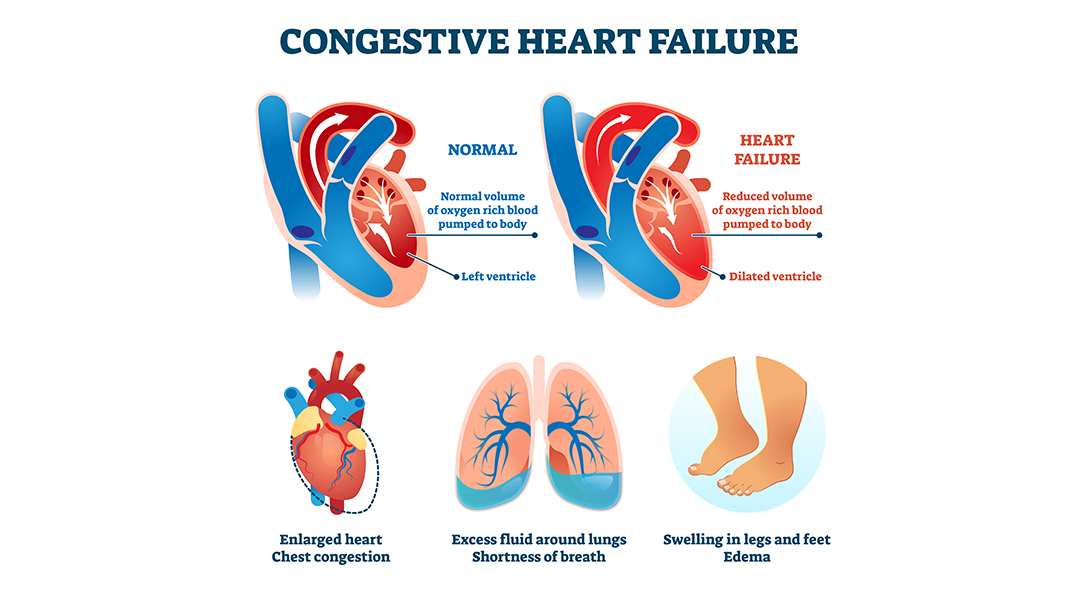
The symptoms of congestive heart failure depend on whether it causes a lack of oxygen supply to the organs or excess fluid buildup in the body.
In the first case, the symptoms include mental confusion, fatigue, and discolored or bluish skin. In the second case, heart failure can lead to symptoms, such as shortness of breath, coughing, wheezing, weight gain, swelling in the feet, legs, and abdomen, and loss of appetite.
Treatment of Congestive Heart Failure
The treatment of congestive heart failure depends on its underlying cause and the side of the heart that’s affected. A doctor will order a series of tests, such as chest X-ray, ECG, echocardiogram, and coronary angiography. Routine blood tests, such as lipid panel and electrolyte tests, might be needed, too.
Once the root cause is identified, your doctor can prescribe one or more of the following medications:
- Diuretic or water pills
- Beta-blockers
- ACE inhibitors or Angiotension receptor Neprilysin inhibitor
- Digoxin
- Anticoagulants
Additionally, the doctor will recommend lifestyle changes, including exercise, a low-sodium diet, and weight loss. Also, they’ll ask you to quit smoking and limit alcohol consumption. In extreme cases, patients need a heart transplant or ventricular assist device (VAD) to improve their quality of life.
Wrapping Up
Congestive cardiac failure is a chronic condition with no known cure. If left untreated, it can lead to organ damage and death. However, a proper treatment plan comprising lifestyle changes and medications can help manage various symptoms.
Dr. C Raghu is a renowned cardiologist and a specialist in interventional cardiology. If you or anyone you know is experiencing symptoms of heart failure, don’t hesitate to contact Dr. Raghu right away.
Book Online Consultaion
Congestive Cardiac Failure – Blog
Subscribe the Hearty Life Blogs
Copyright © 2023, Dr. Raghu. All rights reserved.
+91 95424 75650

+91 95424 75650

